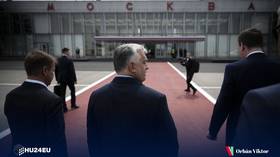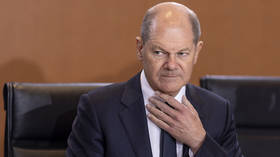Orban visits Russia

Hungarian Prime Minister Viktor Orban has arrived in Moscow, where he is expected to meet with Russian President Vladimir Putin to discuss ways to resolve the Ukraine conflict.
Orban’s arrival was announced by his press secretary Bertalan Havasi, who stated that the Hungarian leader had come to Russia “as part of a peacekeeping mission.”
Previously, a number of top EU officials had openly criticized Orban’s plans to visit Russia, with European Council President Charles Michel condemning the trip and insisting that Hungary has “no mandate to engage with Russia on behalf of the EU.” This year, Budapest assumed the EU’s rotating presidency.
Orban, however, has claimed that he doesn’t require any sort of mandate in order to promote peace, noting that his discussions cannot be considered as official negotiations. He also admitted that his country has limited political clout and that peace talks to resolve the Ukraine crisis will most likely be held by larger powers.
“But we can be a good tool in the hands of God, we can be a good tool in the hands of people who want peace,” the prime minister said ahead of his visit.
Speaking to Kossuth Radio on Friday morning, Orban also explained that he hopes to convince both Ukraine and Russia of the need to work together and embark on “a long journey that could end in a ceasefire and peace talks.”
Earlier this week, Orban also traveled to Kiev, where he urged Ukraine’s Vladimir Zelensky to consider an immediate ceasefire.
His proposal, however, was met with rejection. After the trip, Orban stated that Zelensky had “some doubts” regarding the ceasefire suggestion, and “didn’t like it very much” due to his “bad experience in the past with ceasefires.”
Kiev has long insisted that its conflict with Russia should be resolved according to Zelensky’s own ‘peace formula’ - a ten point program which calls for the complete withdrawal of Russian forces from territories Kiev claims as its own, reparation payments, and an international war crimes tribunal for Russia’s leadership.
Moscow has rejected Zelensky’s plan as a non-starter and has insisted that any peace negotiations must be held with consideration of the “realities on the ground.”
Last month, Vladimir Putin presented his own set of terms for starting ceasefire talks. These include a full Ukrainian withdrawal from all Russian territories, including the Donetsk and Lugansk People’s Republics and the Kherson and Zaporozhye regions, as well as legally binding guarantees that ensure Ukraine never joins NATO.













